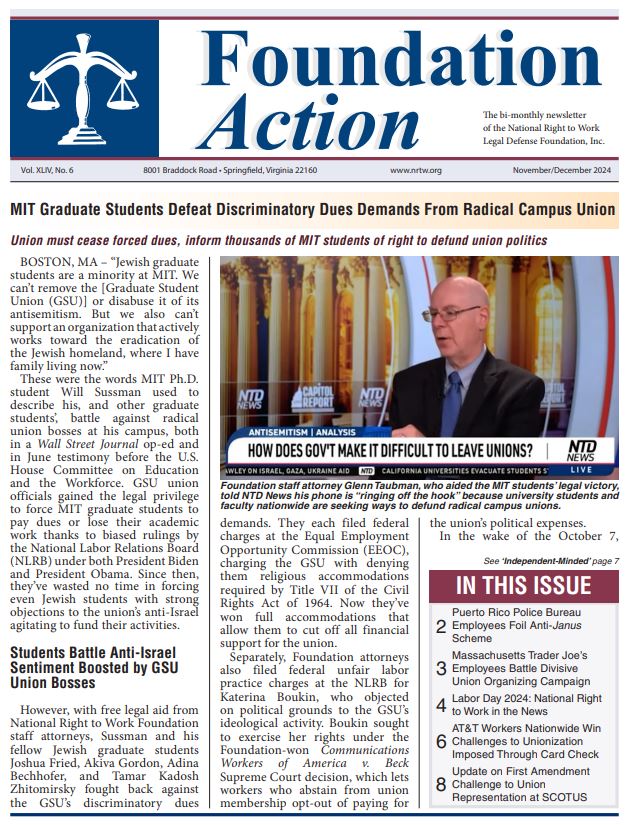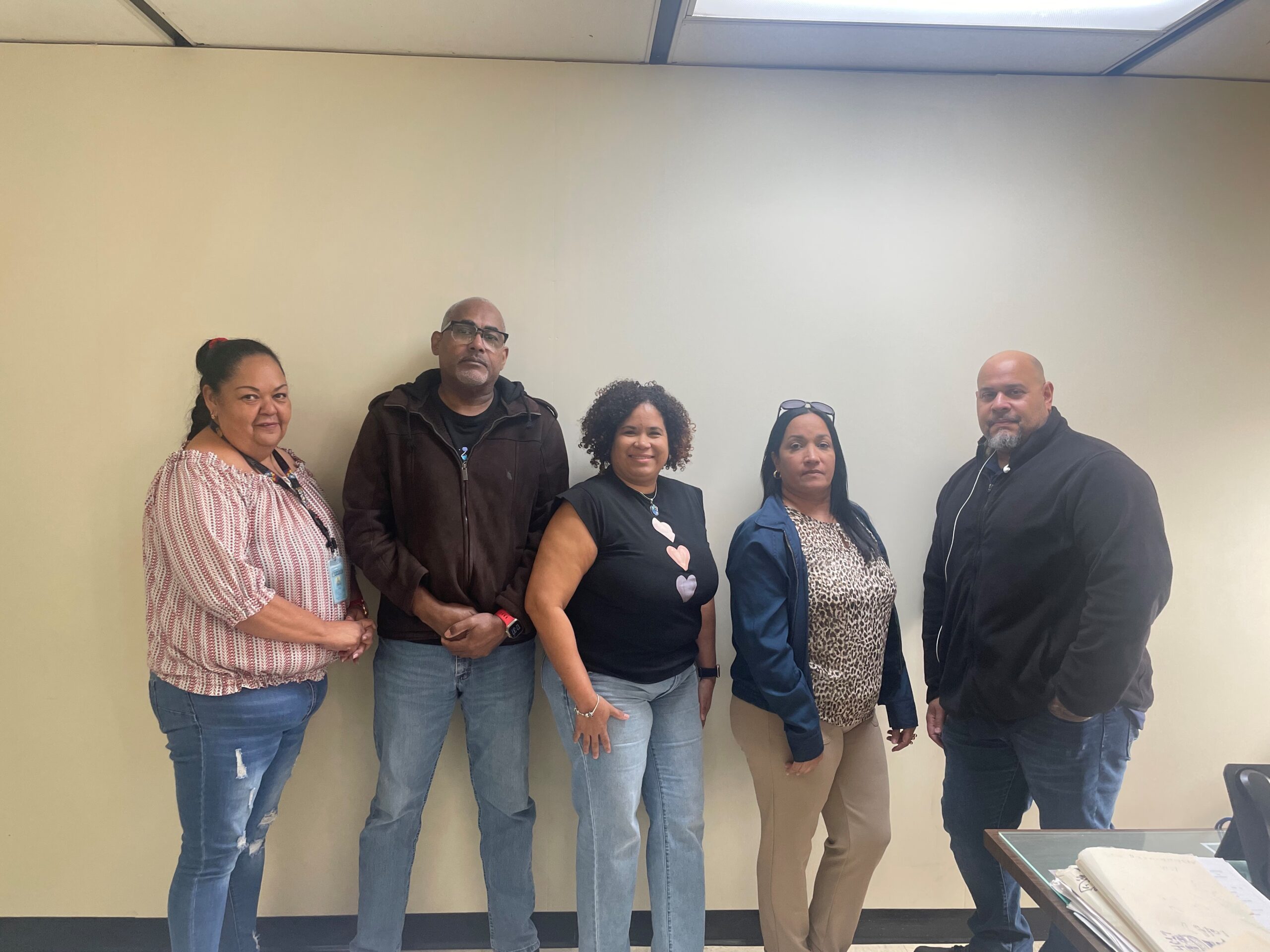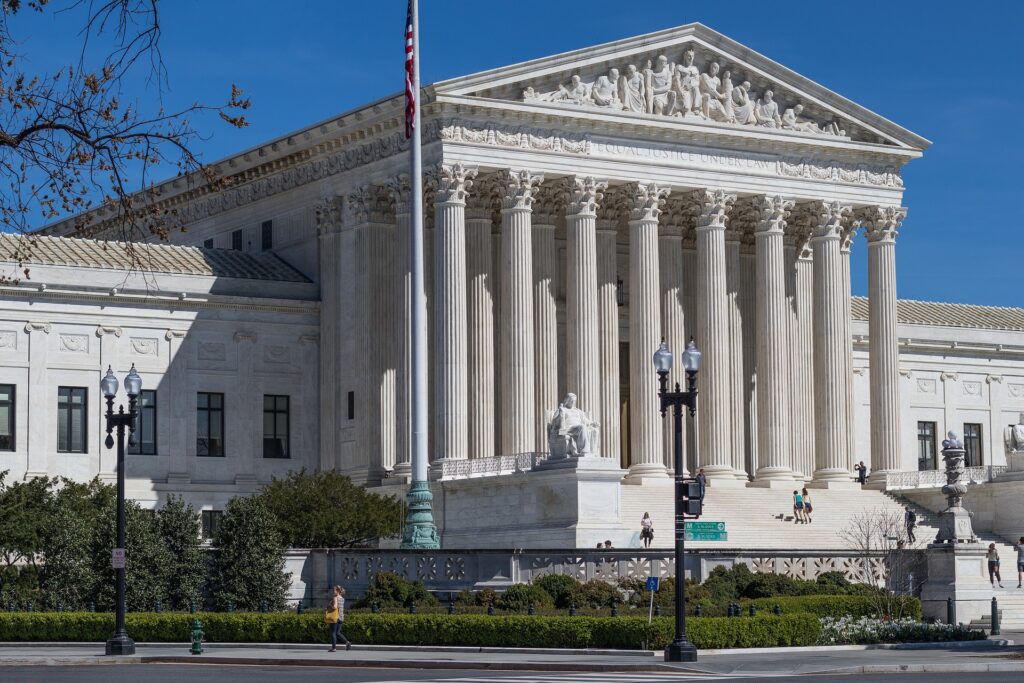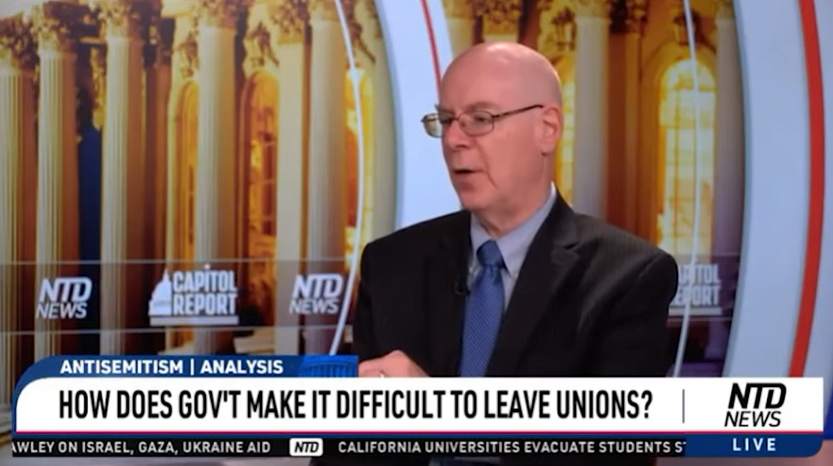Massachusetts Trader Joe’s Employees Battle Divisive Union Organizing Campaign
Trader Joe’s workers demand vote to oust union, blast union bosses in Congress and media
Trader Joe’s employees Les Stratford (left) and Michael Alcorn want to restore the fun and independent work environment that existed in the store before union officials sowed discord.
HADLEY, MA – Union bosses and Big Labor-allied media cheered when the Hadley, MA, branch of supermarket chain Trader Joe’s became the first unionized location in the country in 2022. But what all their celebration concealed was the fact that union officials had swept to power at the location through a deeply deceptive campaign that demonized both the company and many employees. Now many of the Hadley-based Trader Joe’s employees are fighting to kick the union out.
“Officials of this union have sowed division and smeared both our workplace and anyone who dissents from the union’s agenda pretty much from the time the campaign began to unionize the store,” Trader Joe’s employee Les Stratford told Supermarket News about the situation.
Michael Alcorn, another Hadley Trader Joe’s worker who simply wanted to have a conversation with his coworkers about the ramifications of unionizing, said that union militants “weren’t going to have a meeting with us…immediately it was like ‘you either accept the union, or you don’t, and we’re not going to talk about it all together because if you don’t accept it, we don’t trust you.’”
Now, with free legal aid from the National Right to Work Foundation, Stratford, Alcorn, and many other Hadley Trader Joe’s employees are backing an effort to vote the union out of power at the store. Stratford in August submitted a union decertification petition asking the National Labor Relations Board (NLRB) to hold an election among his coworkers on whether to remove the union, which contained well over the support needed to trigger a decertification vote under NLRB rules.
Because Massachusetts lacks Right to Work protections for its private sector workers, the union has the legal privilege to enforce contracts that require Trader Joe’s employees to pay dues or fees as a condition of keeping their jobs.
In Right to Work states, in contrast, union membership and financial support are strictly voluntary. A vote by the majority of Hadley Trader Joe’s employees against the union would free them from both the union’s forced-dues and monopoly bargaining powers.
Trader Joe’s Employee Exposes Union Tactics on Capitol Hill
In May, Alcorn brought the concerns many of the Hadley Trader Joe’s employees had directly into the halls of Congress when he was called by the U.S. House Committee on Education and the Workforce to testify about coercive tactics union bosses use to gain power and stay in power.
In addition to describing the union’s vilification of any skeptical employee, he noted that union organizers tried to foist union control of the workplace through “card check” — a process that bypasses the NLRB’s secret ballot election system and lets union officials aggressively solicit “cards” that are later counted as votes for the union.
Union organizers also “made inaccurate and incomplete press releases, creating false narratives about our workplace to promote their own agenda and personal vendettas,” Alcorn said.
Workers Need More Freedom to Oust Abrasive Union Bosses
The Hadley Trader Joe’s workers’ efforts come as the Biden-Harris NLRB announced a final rule which will make it much harder for rank-and-file workers to exercise their right to vote out union officials they oppose. The final rule, among other things, lets union officials prevent decertification votes from going forward by filing unverified “blocking charges” alleging employer interference.
While the Trader Joe’s employees’ petition will be unaffected by the rule change, the new policy will likely quash or substantially delay similar efforts in the future. “The situation at the Hadley, MA, Trader Joe’s store shows exactly why workers’ right to vote to remove a union they oppose must be protected,” commented National Right to Work Foundation Legal Director and Vice President William Messenger.
“During a union campaign, union officials often employ aggressive tactics and ‘us vs. them’ or hate-the-boss rhetoric that cause division and prioritize union bosses’ agenda over workers’ freedoms and individual choices.
“That the Biden-Harris Administration stripped workers of what few rights they had to challenge union officials that perpetrate these acts shows they are on the side of Big Labor, not individual workers,” Messenger added.
DOJ Attorney Challenges NTEU Union Bosses’ Attempt to Grab Control Over Justice Department Divisions Ahead of Admin Change
Filings: Federal Labor Relations Authority’s decision to approve unionization attempts in Civil Rights and Environmental divisions violates precedent
Washington, DC (January 17, 2025) – A veteran Department of Justice trial attorney has just submitted two filings challenging a last-minute attempt by the National Treasury Employees Union (NTEU) to gain monopoly bargaining control over attorneys at the Civil Rights Division (CRT) and Environmental and Natural Resources Division (ENRD). The attorney, Jeffrey Morrison, filed these Applications for Review at the Federal Labor Relations Authority (FLRA) with free legal aid from the National Right to Work Legal Defense Foundation.
Morrison’s filings come after a unionization campaign during which DOJ management and NTEU union officials unilaterally “agreed” that the CRT and ENRD were work units appropriate for unionization, even though they are not appropriate bargaining units under longstanding FLRA precedent. Morrison’s Applications for Review argue that this and other legal issues with the proposed work units invalidate an FLRA Regional Director’s earlier decision to push forward the unionization process.
“Here, the Regional Director failed to apply established FLRA precedent that precludes finding CRT professional[s] to be an appropriate unit,” Morrison’s Application for Review says. “The Regional Director’s direction of election in this matter was thus in error. The Authority should grant review, stay the certification of the election results, reverse the Regional Director’s decision, and dismiss the petition.”
The FLRA is the federal agency responsible for adjudicating disputes between federal employees, union officials, and agencies within the federal government. The labor law governing federal agencies permits union officials to gain monopoly bargaining power over federal workers, even those who didn’t vote for the union or otherwise oppose it.
Despite 1984 FLRA Decision Rejecting Attempt to Unionize Civil Rights Division Attorneys, DOJ Abruptly Dropped Opposition to NTEU Unionization Attempt Shortly After Election Day
Morrison’s Applications for Review advance several arguments as to why NTEU bosses shouldn’t be able to gain control over the departments at issue. Notably, one brief points out that the FLRA ruled earlier in its Antitrust Division case that CRT lawyers “did not have a separate and distinct community of interest from other DOJ trial attorneys” and for that reason couldn’t stand as a distinct bargaining unit.
“[I]n that case, the Authority determined this very unit to not be an appropriate unit…The Regional Director’s failure to comply with current, binding Authority precedent is in error and must be reversed,” the brief says.
In fact, the brief notes, DOJ management maintained that very same concern about the NTEU’s unionization attempt until roughly three days after federal elections, when DOJ management abruptly reversed course and adopted the NTEU’s position.
Morrison’s applications contend that the FLRA “fail[ed] to conduct an independent investigation into the appropriateness of the unit,” despite the fact that it is required by law to do this before any unionization attempt on federal employees goes forward. “An agency agreeing with a union that a unit is appropriate does not mean that unit is actually appropriate. Agencies, like DOJ here, cannot usurp the Authority’s role in deciding unit appropriateness…” say the briefs.
“In the midst of a change in administration, NTEU union bosses and Biden DOJ officials appear to have colluded to flout longstanding precedent that says Justice Department attorneys cannot legally be unionized division by division,” commented National Right to Work Foundation President Mark Mix. “The FLRA has ignored both standard procedures and established precedent to let this hasty unionization attempt go through, and our attorneys are proud to assist Mr. Morrison in opposing this suspect legal maneuver.
“No worker should be subjected to unionization they oppose, and it is especially egregious that an outgoing Administration would violate the law in an attempt to entrench union bosses at the Justice Department, whose employees are charged with defending and enforcing federal law,” added Mix.
Troy-Based Eaton Corporation Worker Challenges IAM Union Scheme Pushing Termination, Fines on Workers Who Oppose Union
Federal charge: IAM officials illegally demanded money, threatened termination of workers who resigned union membership after divisive strike
St. Louis, MO (January 9, 2025) – An employee of power management firm Eaton Corporation’s Troy, Illinois, facility has just filed federal charges against the International Association of Machinists (IAM) union for violating the rights of multiple employees at his workplace. The employee, Robert Jacobs, maintains that IAM officials are threatening to get him and other employees who resigned union membership fired unless they pay a so-called “reinstatement fee” concocted by the union. Jacobs filed his charges at the National Labor Relations Board (NLRB) with free legal aid from National Right to Work Legal Defense Foundation staff attorneys.
Under federal labor law, which the NLRB is charged with enforcing, private sector employees have an absolute right to resign union membership. This right is codified in the National Labor Relations Act (NLRA), and was affirmed by landmark Supreme Court decisions such as General Motors v. NLRB. Federal law further spells out that neither employers nor union officials can compel private sector workers to participate in union activities or refrain from such activities.
However, in states like Illinois that lack Right to Work protections for their private sector workers, union officials have the legal privilege to enforce contracts that require every employee in a unionized workplace, including those who have abstained from formal union membership, to pay some portion of union dues as a condition of keeping their jobs. In contrast, in Right to Work states, union financial support is fully voluntary and the choice of each individual employee.
“I and several of my colleagues don’t want to be part of the IAM union, but we are required by law to pay fees to union bosses just to keep our jobs,” commented Jacobs. “That’s already something that we don’t want to do. But IAM officials are going even further and hitting us with hundreds of dollars in made-up fees just because we exercised our right to not be union members.”
Post-Strike, IAM Lodge 660 Union Officials Impose $300+ Fine on Workers Who Quit Union Membership
Last October, IAM union officials ordered Eaton Corporation employees – which comprise a work unit of over 400 people – to strike. After the strike concluded, worker opposition to IAM union bosses’ priorities increased and many decided to end their union memberships, including Jacobs.
According to Jacobs’ federal charge, which was filed on the last day of 2024, “the Union is presently threatening Charging Party and [other employees who resigned from the union] with termination if they fail to pay a $306 ‘reinstatement fee’ by January 2025.” The charge argues that the IAM union is violating Eaton employees’ rights under Section 7 of the NLRA, which safeguards employees’ “right to refrain from any or all of” union activities.
Foundation attorneys have recently assisted other employees nationwide in challenging IAM union bosses’ influence, including last August in Dover, Ohio, and Petaluma, California, where employees at two different Ford dealerships successfully forced out IAM Local 1363 and IAM Local 1596 union officials, respectively. In 2022, Foundation attorneys also successfully attacked an illegal dues scheme imposed by IAM union officials on Boeing engineer Don Zueger, which incorrectly calculated the amount of money he could be required to pay to the union as a nonmember.
“Instead of seeking to win Eaton employees’ voluntary support, IAM union officials have decided to effectively extort the workers they claim to ‘represent,’” commented National Right to Work Foundation President Mark Mix. “Threatening to terminate workers if they don’t pay a fee that is apparently intended to punish those who don’t want union bosses speaking for them tarnishes employee rights and freedom.
“Mr. Jacobs’ case shows the tactics union officials will use to force fealty out of independent-minded workers, which is why it’s important that workers in Illinois and across the nation have the Right to Work freedom to cut off all financial support to union bosses they oppose,” Mix added.
Fairmont, MN, Mayo Clinic Nurses Vote to Remove MNA Union From Facility
Latest in string of union ejections by Mayo Clinic healthcare professionals across state
Fairmont, MN (January 8, 2025) – Nurses at Mayo Clinic’s Fairmont Medical Center have just voted 26-15 to eject Minnesota Nurses Association (MNA) union officials from their facility. The push to remove the union was spearheaded by Mayo Fairmont employee Jamie Campbell, who submitted to the National Labor Relations Board (NLRB) in December 2024 a petition seeking a union decertification vote among her colleagues.
The NLRB is the federal agency responsible for enforcing federal labor law, which includes administering elections to install (or “certify”) and remove (or “decertify”) unions. Campbell’s union decertification petition contained well over the number of employee signatures needed to trigger a decertification vote under NLRB rules. According to Campbell’s petition, the work unit covered by the vote included all “registered general duty nurses and charge nurses.”
Because Minnesota lacks Right to Work protections for its private sector workers, MNA union officials had the legal power to require all the Fairmont Mayo nurses to pay at least a portion of union dues as a condition of keeping their jobs. In contrast, in Right to Work jurisdictions, union membership and all union financial support are voluntary and the choice of each individual worker. However, in both Right to Work and non-Right to Work states, union officials are able to impose one-size-fits-all contracts on all employees in a work unit, even those who voted against or otherwise oppose the union.
Pending a certification of the vote result by NLRB officials, Fairmont Mayo nurses will be free from both the forced-dues and monopoly bargaining power of the MNA union.
“The MNA was a very divisive force in our workplace, and I think we’ll be able to better serve our patients and the community without the union,” commented Campbell on the vote. “We hope the NLRB quickly certifies the vote and that union officials respect our decision.”
Fairmont Nurses Join Other Healthcare Professionals Across MN in Ousting Unwanted Unions
Since 2022, several sizable units of healthcare workers in Minnesota have sought out Foundation legal aid to obtain removal votes against the MNA and other unions, and have often been successful in freeing themselves. Nurses and nurse support staff at Mayo Clinic’s Mankato branch voted MNA and American Federation of State County, and Municipal Employees (AFSCME) Local 1856 union officials out of their facility between 2022 and 2023, and nurses at Mayo’s St. James branch did the same with AFSCME Council 65 in August 2022. Employees from four Cuyuna Regional Medical Center locations across the Brainerd Lakes region of Minnesota also sought Foundation aid in their decertification effort against Service Employees International Union (SEIU) officials in 2022.
“MNA union bosses’ influence and political connections did not shield them from suffering another defeat by rank-and-file nurses at the ballot box,” commented National Right to Work Foundation President Mark Mix. “Ironically, Minnesota’s lack of Right to Work protections – which are vociferously opposed by the MNA – likely removed an important accountability tool from the relationship between the MNA and the nurses they claim to ‘represent.’ It’s no surprise that union bosses who can force workers to pay union dues or fees on pain of termination wind up being far less effective and more out-of-touch than union officials who must earn the voluntary financial support of each worker.”
Jewish CUNY Professors’ Groundbreaking Bid at Supreme Court Challenging Forced Union Association Fully Briefed
Profs challenge NY law forcing them under ‘representation’ of anti-Semitic union officials; seek First Amendment ruling against union coercion of public employees
Washington, DC (December 23, 2024) – The final brief has been submitted urging the U.S. Supreme Court to hear six City University of New York (CUNY) professors’ First Amendment case challenging the monopoly representation powers of Professional Staff Congress (PSC) union officials. The professors, five of whom are Jewish, want to dissociate completely from PSC based on public statements and other actions the professors find highly anti-Semitic and anti-Israel, but New York state law forces the professors to accept the union’s so-called “representation.”
The professors, Avraham Goldstein, Michael Goldstein, Frimette Kass-Shraibman, Mitchell Langbert, Jeffrey Lax, and Maria Pagano, are receiving free legal aid from the National Right to Work Legal Defense Foundation and The Fairness Center. The lawsuit challenges aspects of New York State’s “Taylor Law”, which grants union bosses monopoly bargaining power in the public sector. This gives union bosses the power to speak and contract for public workers, including those that want nothing to do with the union. In addition to opposing the union’s extreme ideology, the professors oppose being forced into a “bargaining unit” of instructional staff who share the union’s objectionable beliefs or have employment interests diverging from their own.
The professors’ original petition for writ of certiorari, filed in July, points out that the High Court has, for decades, recognized how public sector monopoly bargaining burdens workers’ First Amendment freedom of association rights. In 1944, the Supreme Court’s decision in Steele v. Louisville & Nashville Railway Co. recognized how rail union bosses were manipulating their powers over the workplace to discriminate against African-American railway workers. The Supreme Court restated its concerns most recently in the 2018 Foundation-won Janus v. AFSCME decision, calling monopoly bargaining “a significant impingement on associational freedoms.”
In the latest filing, Foundation attorneys continue attacking PSC lawyers’ theory that the Supreme Court’s 1984 decision in Minnesota State Board for Community Colleges v. Knight – a case that dealt with the unrelated topic of whether public employees who had abstained from union membership had a right to attend union meetings – should dictate an unfavorable outcome for the professors in this case.
“This case squarely presents the question whether it violates the First Amendment for a state to prohibit individuals from dissociating from a union’s representation to protest that union’s expressive activities.… As the Professors stated in their complaint and briefs, by compelling them to remain under the yoke of PSC’s representation, PSC and CUNY quash the Professors’ ability to express their revulsion with PSC’s advocacy. They should be free to completely dissociate themselves from that advocacy group.”
Law Forces Jewish CUNY Professors to Associate with Anti-Israel PSC Union
The professors’ original complaint recounted that several of the professors chose to dissociate from PSC based on a host of discriminatory actions perpetrated by union agents and adherents, including a June 2021 union resolution that the professors viewed as “anti-Semitic, anti-Jewish, and anti-Israel.”
The complaint said Prof. Michael Goldstein “experienced anti-Semitic and anti-Zionist attacks from members of PSC, including what he sees as bullying, harassment, destruction of property, calls for him to be fired, organization of student attacks against him, and threats against him and his family.” Goldstein has needed a guard to accompany him on campus, the complaint noted.
Prof. Lax, the complaint explained, already received in a separate case a letter of determination from the Equal Employment Opportunity Commission (EEOC) “that CUNY and PSC leaders discriminated against him, retaliated against him, and subjected him to a hostile work environment on the basis of religion.” Prof. Lax “has felt marginalized and ostracized by PSC because the union has made it clear that Jews who support the Jewish homeland, the State of Israel, are not welcome,” said the complaint. As their petition of certiorari notes, these conflicts have significantly increased since October 7, 2023.
SCOTUS Asked to Overturn Laws Imposing Union Power on Public Workers
The petition asks the Supreme Court to take up the case and stop CUNY and the State of New York from letting PSC union bosses impose their “representation” on the professors. It also demands that the Court declare unconstitutional Section 204 of New York’s Taylor Law to the extent that it compels the professors under union power.
University faculty and students across the country are increasingly seeking out Foundation legal aid to counter union coercion within the academic sphere – especially coercion relating to anti-Semitic or anti-Israel agendas that union bosses are pushing. In August, five Jewish Massachusetts Institute of Technology (MIT) graduate students won favorable settlements after pro-BDS Graduate Student Union (GSU-UE) officials tried to force them to pay for the union’s activities despite their requests for religious accommodations under the Civil Rights Act of 1964. A mathematics Ph. D. student at Dartmouth is pursuing a similar religious discrimination case with Foundation aid.
“No public worker should be forced to associate with union officials who denigrate their culture and identity. But unfortunately this is exactly what New York State’s Taylor Law and many similar laws around the country allow,” commented National Right to Work Foundation President Mark Mix. “The Supreme Court has expressed concerns with monopoly bargaining for decades, and it’s high time that the justices finally acknowledge the First Amendment protects government employees from being forced to accept ‘representation’ they adamantly oppose.”












